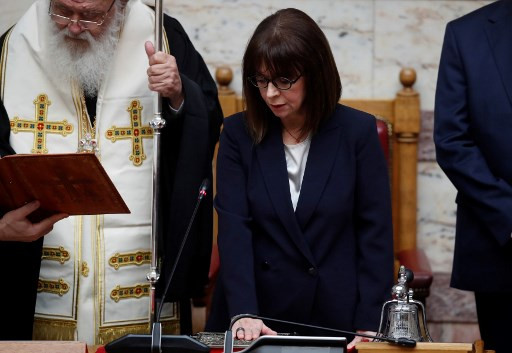Popular Reads
Top Results
Can't find what you're looking for?
View all search resultsPopular Reads
Top Results
Can't find what you're looking for?
View all search resultsGreece's first woman president vows to defend borders, rights, warns on virus
Change text size
Gift Premium Articles
to Anyone
 Newly elected Greek President Katerina Sakellaropoulou takes an oath during the swearing in ceremony at the Greek Parliament in Athens, on March 13, 2020. Greece’s first female president, a former high court judge, Katerina Sakellaropoulou, 63, was being formally sworn in to office, nearly two months after the country’s parliament voted overwhelmingly to elect her. The swearing in ceremony for Katerina Sakellaropoulou was being held in an almost empty parliament, as part of measures being taken to prevent the spread of the new coronavirus
(AFP/Thanassis Stavrakis)
Newly elected Greek President Katerina Sakellaropoulou takes an oath during the swearing in ceremony at the Greek Parliament in Athens, on March 13, 2020. Greece’s first female president, a former high court judge, Katerina Sakellaropoulou, 63, was being formally sworn in to office, nearly two months after the country’s parliament voted overwhelmingly to elect her. The swearing in ceremony for Katerina Sakellaropoulou was being held in an almost empty parliament, as part of measures being taken to prevent the spread of the new coronavirus
(AFP/Thanassis Stavrakis)
G
reece's first woman president began her term on Friday with a pledge to protect the country's borders and defend human rights, whilst warning Greeks to follow health rules as the country grapples with over 100 coronavirus cases.
Katerina Sakellaropoulou, a 63-year-old former senior judge, said she would "walk together" with Greeks to create a "prosperous" and "cosmopolitan" future "that includes all of us."
The new head of the Greek state begins her five-year term in a terse standoff with neighbouring Turkey, which has allowed tens of thousands of refugees to mass at the border.
Sakellaropoulou said Greeks had to "repulse the aggression of those who make designs on our national sovereignty by making use of human pain."
The new president also insisted that Greece had a "humanitarian duty" to defend "defenceless and desperate people."
Heed virus warnings
Greece has so far announced 117 cases of the coronavirus, one of whom died on Thursday after 10 days in hospital.
Three people are in intensive care and the government has shut down schools and universities, courts, cinemas, gyms and other indoor public gathering areas for two weeks in an effort to curb the outbreak.
Sakellaropoulou urged the public to follow health warnings "to avoid spreading panic" which could tear apart the health system and harm the economy.
Sakellaropoulou took a religious oath in parliament before Archbishop Ieronymos, head of the Orthodox Church of Greece.
She placed a wreath at the Tomb of the Unknown Soldier -- Greece's foremost military monument -- before heading to the presidential mansion for a handover ceremony with outgoing president Prokopis Pavlopoulos.
No handshakes
Known as low-key and living in a working-class district of Athens, Sakellaropoulou has made it known she prefers to be called Katerina, instead of the more formal Ekaterini.
The ceremony in parliament was drastically scaled back as a result of the virus outbreak, with around 150 guests present instead of a planned 1,000 -- and no handshakes.
Nominated by Prime Minister Kyriakos Mitsotakis, Sakellaropoulou was elected by parliament in January by 261 out of 300 lawmakers, one of the broadest cross-party majorities in Greek history.
The petite, bespectacled former judge has set out her priorities as tackling the economic crisis, climate change and mass migration.
The new president was until now the head of Greece's top administrative court, the Council of State.
The daughter of a Supreme Court judge, Sakellaropoulou completed postgraduate studies at the Sorbonne university in Paris.
She was also the first woman to lead the Council of State.
Sakellaropoulou said she hoped her election to the five-year post "would improve the status of all (Greek) women in family and society.
"It is time for the women of this country to realise that they can fulfil their dreams based on their merit, without facing obstacles just because they were born female," she said.
Although the president is nominally the head of the Greek state and commander-in-chief, the post is largely ceremonial.
Greek presidents confirm governments and laws and technically have the power to declare war -- but only in conjunction with the government.









